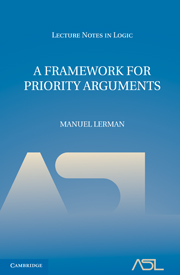Book contents
- Frontmatter
- Contents
- PREFACE
- CHAPTER 1 INTRODUCTION
- CHAPTER 2 SYSTEMS OF TREES OF STRATEGIES
- CHAPTER 3 Σ1 CONSTRUCTIONS
- CHAPTER 4 Δ2 CONSTRUCTIONS
- CHAPTER 5 Π2 CONSTRUCTIONS
- CHAPTER 6 Δ3 CONSTRUCTIONS
- CHAPTER 7 Σ3 CONSTRUCTIONS
- CHAPTER 8 PATHS AND LINKS
- CHAPTER 9 BACKTRACKING
- CHAPTER 10 HIGHER-LEVEL CONSTRUCTIONS
- CHAPTER 11 INFINITE SYSTEMS OF TREES
- REFERENCES
CHAPTER 9 - BACKTRACKING
Published online by Cambridge University Press: 04 August 2010
- Frontmatter
- Contents
- PREFACE
- CHAPTER 1 INTRODUCTION
- CHAPTER 2 SYSTEMS OF TREES OF STRATEGIES
- CHAPTER 3 Σ1 CONSTRUCTIONS
- CHAPTER 4 Δ2 CONSTRUCTIONS
- CHAPTER 5 Π2 CONSTRUCTIONS
- CHAPTER 6 Δ3 CONSTRUCTIONS
- CHAPTER 7 Σ3 CONSTRUCTIONS
- CHAPTER 8 PATHS AND LINKS
- CHAPTER 9 BACKTRACKING
- CHAPTER 10 HIGHER-LEVEL CONSTRUCTIONS
- CHAPTER 11 INFINITE SYSTEMS OF TREES
- REFERENCES
Summary
The concept of backtracking was introduced in [13]. Backtracking is a procedure that takes a non-λk(ξ)-free node of Tk, and returns it to λk(η)-free status for some η ⊃ ξ, with the same initial derivative. The concept, as manifested in [13], was intertwined with the validity of certain sentences, and so its analysis was substantially more complicated than we need, as we look at it without regard to the requirements assigned to the nodes. The lemmas we prove here can also be generally applied to systems of trees, as there is no dependence on the requirements to be satisfied.
This chapter is devoted to proving lemmas describing the behavior of the backtracking process. Throughout the chapter, we assume that we are dealing with a level ℓ construction.
Backtracking
Backtracking cannot always be carried out. In this section, we identify the sole obstruction to backtracking, and define a sequence generated by primary links that determines how backtracking is to be implemented, when possible.
Definition 9.1.1. Fix m ≤ ℓ, σ, ξ ∈ T0, and σm ∈ Tm. We say that 〈σm, σ〉 is weakly ξ-accessible if init(σm, σ) = σ and there is an η ∈ T0 such that η ⊇ ξ, init(σm, η) = σ and σm ⊆ λm(η); and if this is the case, we call η a witness to the weak ξ-accessibility of 〈σm, σ〉. We say that, 〈σm, σ〉 is ξ-accessible if there is an η ∈ T0 such that η is a witness to the weak ξ-accessibility of 〈σm, σ〉 and upm(η) = σm.
We will prove that 〈σm, σ〉, is weakly ξ-accessible, then iff there is no primary ξ-link restraining σ.
- Type
- Chapter
- Information
- A Framework for Priority Arguments , pp. 147 - 162Publisher: Cambridge University PressPrint publication year: 2010



